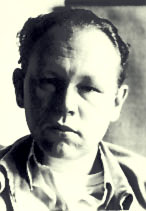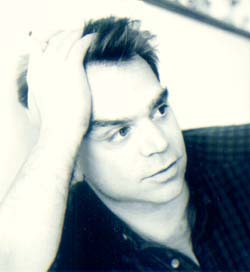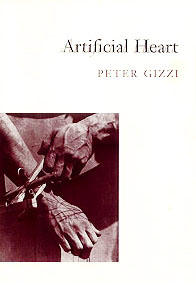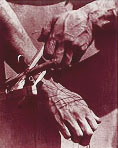
J A C K E T # S E V E N | C O N T E N T S | H O M E P A G E |
| |
| |
| |
A F T E R S P I C E R | |
| |
| |
| |
THERE IS A DARKNESS at the heart of Peter Gizzi's new collection of poems, Artificial Heart, that is far from artificial. It is the all-too-natural darkness at the center of being-there: an originary absence that, as in the myth of Orpheus, cannot be rescued by representation. 
Jack Spicer
Here, "things" are never completely reconciled to their status as signs, even if they are embedded within an elaborate armature of signification, a "renovated trobar," as Gizzi puts it. As revealed in his "Notes," Gizzi's texts are often crystallizations of a complex intertextuality, passing, like wheeling star-systems, through the systems of many other creators (including poets Spicer, Palmer, Creeley, Cadiot, Davidson, Shapiro, and Shelley; musicians David Thomas of Pere Ubu and David Byrne; and artists Manet, Trevor Winkfield, and Joseph Cornell). Thus, even the simple, concrete words used in poems like "Salt" and "Reed" do not point primarily to things but to previous signs (the poems in question are "mirror versions" of poems by Spicer). And yet, Gizzi's poems, even when they are most crowded by other signifying presences, seem also to be haunted - better, pierced - by something that absents itself, that can be signified only as a non-sign, or as the sign of nothing. | |
| |
The heart of poetry is a hollow man | |
| |
| |
| |
The heart of poetry is fatigue | |
| |
| |
| |

| |
| |
| |
| |
There is a concept, identical with zero, and an object falling under it, zero, such that the number which belongs to the concept identical with zero is 1, and the number which belongs to the concept identical with zero but not identical with zero is 0. | |
| |
| |
| |
0 is the number of things that belong to the set non-self-identical; 1 is the number of things belonging to the set identical with zero; 2 is the number of things belonging to the set identical with 0 or 1; and so on to infinity. | |
| |
| |
| |
At zero hour an earth unwrites itself. | |
| |
Zero's "indefatigability" here stands in contradiction to previously-cited testimony about the "fatigue" at poetry's heart (though it seems that both writing and "unwriting" crucially concern issues of vital expenditure); however, this contradiction is already prefigured in the paradox of zero's plenitude itself: at the heart of poetry there lies an empty set, something whose presence is identical with absence. | |
| |
In the codes we use | |
| |
| |
| |

| | |
| |
| |
| |
In the codes we use | |
| |
| |
| |
Some of the news contains lack - | |
| |
In "realizing" emptiness, the poems start a flow of current, a darker circulation within the darkness-and in doing so, initiate a movement toward regeneration, if not redemption. At such moments, Gizzi's poetry rings with a tonality of - a totality of - loss and longing that brings it in proximity to that of Rilke. | |
| |
constant loss beautiful lack repair me | |
| |
Tellingly enough, this final poem is entitled "The De-Evolution of [the Name of] the Father" (my insertion). In Lacanian terms: the subject's assumption of the Other's lack enables the self to win free from an immobilizing subjection to Otherness and to achieve agency as a desiring subject (for desire is coextensive with lack). Once lack is internalized, the subject can traverse the displacements of the symbolic order, and enter into Language. | |
 |
Peter Gizzi's Artificial Heart is available from: Andrew Joron is the author of Science Fiction (Pantograph Press, 1992) and The Removes (Hard Press, 1999). He is also the translator of German philosopher Ernst Bloch's Literary Essays (Stanford University Press, 1998). He lives in Berkeley, California. | |
J A C K E T # 7
Back to Jacket # 7 Contents page |
|